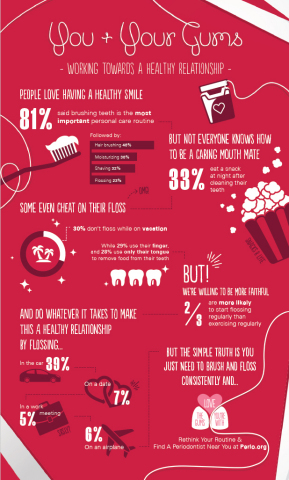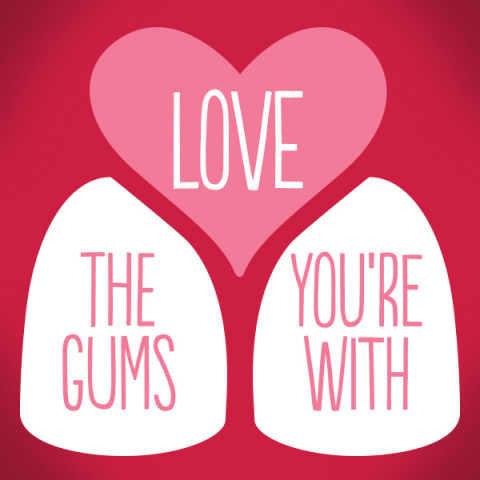CHICAGO--(BUSINESS WIRE)--A new national survey released today reveals Americans are, in fact, flossing; albeit in somewhat odd places: nearly four in 10 (39 percent) of U.S. adults admit to flossing their teeth while in the car; seven percent admitted to flossing while on a date; six percent have flossed on an airplane, and five percent admit they’ve flossed in a work meeting. While some flossing—no matter where—is better than none at all, only seven percent of Americans name flossing as most important to their personal care routines when it comes to perfecting their smiles, revealing that adults can be better educated about healthy smiles, and gums. Periodontists, dentistry’s experts in the treatment and prevention of periodontal disease, have long touted the importance of regular brushing and flossing. Along with brushing teeth twice a day and an annual comprehensive periodontal evaluation, daily flossing is critical to maintaining health gums. The survey, from the American Academy of Periodontology (AAP), was conducted online May 30 and 31, 2018, by Atomik Research among 1,001 U.S. adults.
Personal Care Priorities
Although Americans seem to prioritize strong smiles and place an importance on personal care routines, flossing was not a consistent habit, the survey found. Among those who do floss, less than one in four (23 percent) said flossing was the single most important part of their personal care routine, compared to brushing their hair (48 percent), applying moisturizer (38 percent), shaving (32 percent), and cleaning their ears (25 percent).
“Healthy gums are the foundation of a great smile. Periodontal disease can wreak havoc on that foundation, leading to a negative impact on your smile and your overall health,” says Steven R. Daniel, DDS, president of the AAP and a practicing periodontist in Murfreesboro, Tenn. “Taking care of your gums means more than just flossing when there’s popcorn stuck in your teeth or when you’re killing time in traffic. It also requires integrating diligent at-home care into your personal care routine and regular visits to a periodontist to ensure your mouth is healthy and free of periodontal disease.”
Commonly referred to as gum disease, periodontal disease is a chronic inflammatory disease caused when plaque bacteria accumulates below the gum line and leads to swelling, irritation, and possibly receding gums and tooth loss. Periodontal disease has been linked to many chronic diseases, including diabetes, cardiovascular disease, rheumatoid arthritis, Alzheimer’s disease, and even cancer. Periodontal disease is often silent, with symptoms not appearing until the advanced stages, which could explain why one in every two American adults age 30 and over have periodontal disease. Despite its prevalence, periodontal disease is hardly ever discussed, resulting in a lack of urgency for people to properly care for their gums.
On-Again, Off-Again Habits
The slower, relaxed pace of summertime may also mean consistent oral health habits are more off than they are on. The survey revealed one-third of Americans do not floss on vacation (30 percent). Even more, 33 percent of Americans admit to eating or snacking after they have completed their nighttime teeth-cleaning routine, and nearly one in three (29 percent) said they have used their fingers to get food out of their teeth. Skipping out on daily personal hygiene routines can prove detrimental to one’s health. When you forget or neglect to floss and brush at night, bacteria and plaque can quickly form and with the slowed production of saliva, the bacteria can remain in your mouth all night causing you to wake up with some unpleasant surprises.
Generational Divide on Healthy Mouths
The survey revealed differences for baby boomers and millennials when it comes to healthy mouths. When compared with the millennial generation, one in three boomers (31 percent) said flossing was the most important part of their personal care routine, yet just 20 percent of millennials said the same. Boomers were also the most likely to understand the role of a periodontist in their personal care routine, where nearly eight in 10 (78 percent) correctly responded that periodontists help with healthy teeth and gums.
Take Action
With Americans missing the mark when it comes to caring for their gums, the over 7,500 members of the AAP are passionate about educating and informing the public about proper gum health. Brushing, flossing, and regular visits to your periodontist for a comprehensive periodontal evaluation are the keys to proper oral health. Periodontal disease is preventable and actually reversible, so by taking action and rethinking your oral health regimen, you can repair your relationship with your gums.
Visit Gumblr.org for more information including articles and quizzes and to find a periodontist near you who can create a personalized plan to help support a life-long commitment to healthy gums.
Methodology
The American Academy of Periodontology commissioned Atomik Research to field an online general-population survey of 1,001 people in the U.S. In accordance with Market Research Society guidelines and regulations, the margin of error fell within +/- 2 percentage points with a confidence interval of 95 percent. The fieldwork took place May 30 to May 31, 2018. Atomik Research is an independent, creative market research agency that employs MRA-certified researchers and abides by MRA code.
About Periodontal Disease
Periodontal disease is caused by bacteria in the mouth that form plaque below the gum line. There are more than 500 bacterial species that can be found in plaque, and brushing alone does not remove the bacteria that live below the gum line. Poor oral hygiene is a primary cause of periodontal disease, but several other risk factors play a role in the development and progression of the disease including smoking, age, and genetics. While periodontal disease is mostly preventable and treatable, the early warning signs can be painless, leading to a lack of urgency in people to establish adequate oral hygiene habits or to discuss their periodontal health with a dental professional. With an appropriate diagnosis from a periodontist, the damage from periodontal disease is reversible in many cases.
About the American Academy of Periodontology
The American Academy of Periodontology (AAP) represents more than 7,500 periodontists—experts in the prevention, diagnosis, and treatment of inflammatory diseases affecting the gums and supporting structures of the teeth, and in the placement of dental implants. Periodontics is one of the nine dental specialties recognized by the American Dental Association. Learn more at perio.org.





